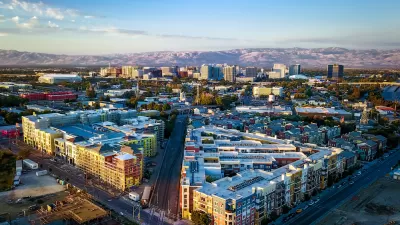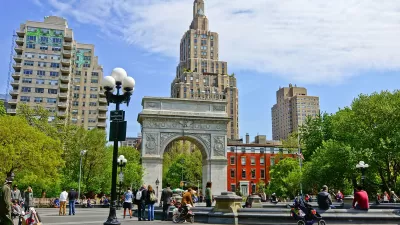Emily Badger of The Atlantic Cities and Bruce Katz of the Brookings Institution sit down with The NewsHour's Gwen Ifill for a discussion on the elections of New York Mayor Bill de Blasio, Detroit Mayor Mike Duggan and Boston Mayor Marty Walsh.
Gwen Ifill introduces this discussion as a look at urban policy and politics. In response to her question about whether the elections were about "change", Emily Badger responds that it applied to two of them:
Bill de Blasio is going to be replacing Michael Bloomberg, who has been there for three terms, for 12 years. The story is even more dramatic in Boston, in that we have had a mayor who has been sitting in that job for 20 years now. I think there are a lot of people in Boston with political ambition who have been waiting a very long time for this guy to retire for a chance to sort of have a changing of the guard there.
With Detroit, the theme may have been pragmatism. Bruce Katz, Vice President and Director, Metropolitan Policy Program states that they hired a “problem solver” in Mike Duggan. Ifill notes that “a majority black city elects the first white mayor in 40 years”.
Badger points to the fact that de Blasio was not being compared to his opponent, Joe Lhota, but to the incumbent mayor.
"The interesting contrast was between Bill de Blasio and Michael Bloomberg, because Bill de Blasio basically sort of built his campaign around saying, I'm going to be the guy who tackles the one thing that everyone have been criticizing Michael Bloomberg for, and that is sort of not paying attention to poverty, not paying attention to the poor, sort of not focusing enough on the fact that sort of all this great prosperity in New York is leaving a lot of people behind.
Finally, in the election of Boston's new mayor, Ifill notes that union organizer Martin Walsh is 24 years younger than Mayor Menino, yet Katz points out the similarity in policy.
He does build on a very solid legacy of Mayor Menino. Menino was in to affordable housing, children and families and, frankly, the innovative economy before a lot of other mayors. So, there's a solid platform for him to build on, but he was able to do it in this very expansive way [referring to the broad coalition that Walsh put together to win the election].
Badger expands on that last point by noting the commonality in all three winning candidates:
I mean, one of the things that's so interesting to me in thinking about what's common between the three of them is that all three of these winning candidates were elected by broad coalitions of different kinds of people, by low-income people, by high-income people, by different races, by different age groups.
FULL STORY: Urban politics shift with fresh faces elected mayor in America's largest cities

Study: Maui’s Plan to Convert Vacation Rentals to Long-Term Housing Could Cause Nearly $1 Billion Economic Loss
The plan would reduce visitor accommodation by 25,% resulting in 1,900 jobs lost.

North Texas Transit Leaders Tout Benefits of TOD for Growing Region
At a summit focused on transit-oriented development, policymakers discussed how North Texas’ expanded light rail system can serve as a tool for economic growth.

Why Should We Subsidize Public Transportation?
Many public transit agencies face financial stress due to rising costs, declining fare revenue, and declining subsidies. Transit advocates must provide a strong business case for increasing public transit funding.

How to Make US Trains Faster
Changes to boarding platforms and a switch to electric trains could improve U.S. passenger rail service without the added cost of high-speed rail.

Columbia’s Revitalized ‘Loop’ Is a Hub for Local Entrepreneurs
A focus on small businesses is helping a commercial corridor in Columbia, Missouri thrive.

Invasive Insect Threatens Minnesota’s Ash Forests
The Emerald Ash Borer is a rapidly spreading invasive pest threatening Minnesota’s ash trees, and homeowners are encouraged to plant diverse replacement species, avoid moving ash firewood, and monitor for signs of infestation.
Urban Design for Planners 1: Software Tools
This six-course series explores essential urban design concepts using open source software and equips planners with the tools they need to participate fully in the urban design process.
Planning for Universal Design
Learn the tools for implementing Universal Design in planning regulations.
Ascent Environmental
Borough of Carlisle
Institute for Housing and Urban Development Studies (IHS)
City of Grandview
Harvard GSD Executive Education
Toledo-Lucas County Plan Commissions
Salt Lake City
NYU Wagner Graduate School of Public Service





























